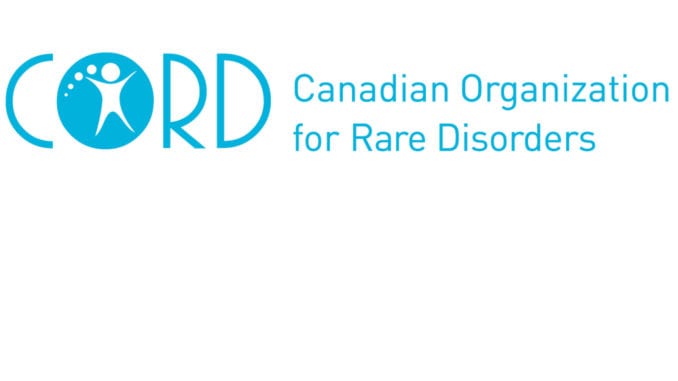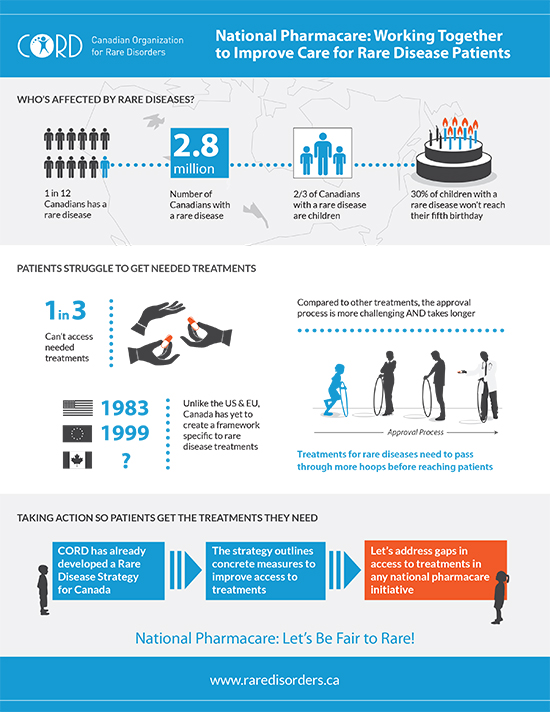

- Today, less than 60% of treatments for rare disorders make it into Canada
- In Canada, 1 in 3 rare disease patients say they can’t get the drug they need through their drug plans
Ottawa, ON – March 20, 2018 – Will a national pharmacare program make it easier or harder for rare disease patients to get the medicines they need? “If new pharmacare looks like old public pharmacare then it could be disastrous for rare disease patients,” said Durhane Wong-Rieger, President and CEO of the Canadian Organization for Rare Disorders (CORD). “Right now, families with a private drug plan can access an appropriate therapy almost as soon as it is approved by Health Canada. If you rely on public drug coverage, you could wait two or more years, just to learn than only about half of you will qualify, even if it is a life-saving drug or the only drug for your child’s condition.”
On March 20th, just in advance of CORD’s annual Rare Disease Day Conference, dozens of patients, family members and supporters will converge on Parliament Hill to meet with Members of Parliament to deliver one simple message, “National Pharmacare: Let’s be fair to rare.”
What’s unfair now? Seven-year-old Sophie with spinal muscular atrophy (SMA) is receiving the only medication specifically approved for SMA through her parent’s work-sponsored drug plan. Her parents have already seen improvements. For nine-year-old Erin with a similar diagnosis but no private drug coverage, it’s a different story and outcome. The government-sponsored agency that reviews drugs for the public plans has recommended only those infants with the most severe form of SMA be covered, which excludes children like Sophie and Erin.
“A national pharmacare program could ‘right the wrongs’ in how our patients access therapies today,” says Susi Vander Wyk, Executive Director of Cure SMA Canada and mother of a child with SMA. “But only if we all agree that rare disease patients should have fair and equitable access, and the National Pharmacare Advisory Council engages with rare disease patients and families in the consultation process.”
CORD is pleased that the mandate for the new federal National Pharmacare Advisory Council includes assessment of international models and establishment of expert reference groups. We are ready and able to contribute to the process. For the past decade, CORD has brought international experts and best practices to Canada and has championed pharmacare changes that could address the unfairness of current policies and practices.
Moreover in 2015, CORD launched Canada’s Rare Disease Strategy, which represents a comprehensive integrated approach to diagnosis, expert care, community support, treatment and research. We have proposed a system-wide strategy that would ensure responsive, responsible, and reasonable access to therapeutics for rare diseases that works for patients, for the healthcare system, and society as a whole.
So rare disease patients won’t need to fear national pharmacare and possibly, embrace it.
– 30 –
For further information:
Angela Covato, CORD
Tel: 416-969-7435
Email: angela@raredisorders.ca
About Canada’s Rare Disease Strategy
Canada’s Rare Disease Strategy establishes five major goals specifying 20 practical actions. The five goals are: improving early detection and prevention; providing timely, equitable and evidence-informed care; enhancing community support; providing sustainable access to promising therapies; and promoting innovative research. For the complete strategy, go to: www.raredisorders.ca/canadas-rare-disease-strategy/. Follow us on Twitter at #Canada4Rare.
About CORD
CORD, the Canadian Organization for Rare Disorders, is Canada’s national network for organizations representing all those with rare disorders. CORD provides a strong common voice to advocate for health policy and a healthcare system that works for those with rare disorders. CORD works with governments, researchers, clinicians and industry to promote research, diagnosis, treatment and services for all rare disorders in Canada. www.raredisorders.ca
INFOGRAPHIC
Click image to open

